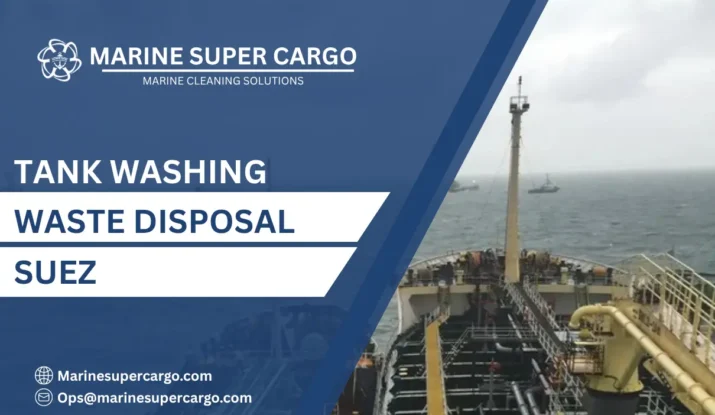Understanding Tank Washing Waste Disposal Suez Regulatory Framework
Vessels conducting cargo operations in the Suez Canal region must navigate complex regulations governing tank washing waste disposal Suez procedures. Marine Super Cargo provides comprehensive guidance ensuring full compliance with Egyptian national requirements and international maritime conventions affecting waste management practices.
The regulatory landscape for tank washing waste disposal Suez encompasses multiple jurisdictional layers. International conventions established by the International Maritime Organization (IMO) form the foundation, while Egyptian maritime authorities enforce additional national standards specific to operations within their territorial waters and canal zone.
MARPOL Annexes Governing Tank Washing Waste
MARPOL Annex I establishes international standards for oil pollution prevention, including tank washing waste disposal Suez requirements for petroleum cargo tanks. The annex prohibits discharge of oil or oily mixtures except through approved port reception facilities meeting specified standards.
Documentation requirements under MARPOL demand meticulous record-keeping. Oil Record Books and Cargo Record Books must accurately reflect all tank washing operations and waste disposal activities. Entries should detail quantities discharged, facility identifications, and dates of operations. These records face scrutiny during port state control inspections.
Egyptian National Regulations and Port Authority Requirements
Egyptian maritime law incorporates MARPOL provisions while adding specific national requirements for tank washing waste disposal Suez operations. The Suez Canal Authority maintains oversight of environmental compliance throughout the canal zone, enforcing strict standards protecting water quality in this sensitive maritime corridor.
Penalties for non-compliance prove severe. Violations may result in substantial fines, vessel detention, or prohibition from future canal transits. Marine Super Cargo maintains current knowledge of all regulatory requirements, ensuring clients avoid costly compliance failures.

Waste Classification and Handling Requirements
Proper classification forms the foundation of compliant tank washing waste disposal Suez operations. Waste categories determine required handling procedures, reception facility specifications, and documentation standards. Misclassification creates compliance risks and potential environmental hazards.
Petroleum cargo residues require classification by oil content and contamination levels. High-viscosity residues demand specialized handling equipment and treatment processes. Low-viscosity washings may undergo separation treatment before final disposal, recovering usable oil products.
Related services include port reception facilities and oily water treatment operations that provide comprehensive waste management solutions beyond tank washing residues.
Documentation and Certification Procedures
Complete documentation ensures regulatory compliance throughout tank washing waste disposal Suez processes. Pre-arrival notifications must accurately describe waste characteristics, enabling authorities to verify facility suitability and capacity availability.
Vessels incorporate facility certificates into Oil Record Books or Cargo Record Books as supporting documentation. Cross-referencing ensures auditors can verify disposal claims against official facility records. Missing or incomplete documentation raises red flags during inspections.
Best Practices for Regulatory Compliance
Successful tank washing waste disposal Suez compliance begins with advance planning. Vessels should schedule disposal operations during planned port calls, allowing adequate time for facility coordination and regulatory notifications. Rush arrangements increase error risks and potential compliance gaps.
Communication between vessel, facility, and authorities prevents misunderstandings. Clear descriptions of waste types, accurate quantity estimates, and realistic scheduling create smooth operational flow. Marine Super Cargo facilitates trilateral communication, ensuring all parties maintain consistent understanding
Emerging Regulatory Trends
Environmental regulations continue evolving toward stricter standards. Future amendments to MARPOL may establish enhanced reporting requirements or reduced discharge limits. Regional authorities increasingly adopt progressive standards exceeding minimum international requirements.
Proactive compliance positioning prepares operators for regulatory evolution. Adopting best practices exceeding current minimums creates buffer against future requirement increases. Marine Super Cargo monitors regulatory developments, advising clients on emerging compliance considerations.
Frequently Asked Questions
Q1: How far in advance must vessels notify authorities about tank washing waste disposal?
Vessels should notify Egyptian authorities at least 24 hours before entering territorial waters, providing waste type, quantity estimates, and intended disposal location.
Q2: Can tank washing waste be discharged during canal transit?
No. Discharge must occur at approved port reception facilities during designated stops. No overboard discharge is permitted within canal waters.
Q3: What penalties apply for non-compliant waste disposal?
Violations may result in fines ranging from $10,000 to $50,000, vessel detention, and potential prohibition from future Suez Canal transits.
Q4: Are waste reception certificates recognized internationally?
Yes. Certificates from Egyptian-approved facilities are accepted worldwide for port state control inspections and regulatory compliance verification.
Q5: How long must vessels retain waste disposal documentation?
MARPOL requires retention for three years from the date of disposal. Vessels should maintain both original certificates and record book entries.


